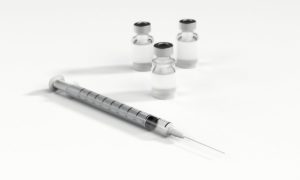Phytochemicals
Fruits, vegetables, and other plants contain a naturally occurring compound known as phytochemicals (or phytonutrients). Phytochemicals refer to a variety of compounds that give fruits and vegetables their color and flavor. Studies show that phytochemicals support the:
- Immune system
- Creation of healthy cells
- Death of damaged cells (such as cancer cells).
Phytochemicals also act as antioxidants to protect the body from damage.
Eating a variety of fruits, vegetables, whole grain, and beans in a variety of colors is the best way to add phytochemicals to your menus. Visit The American Institute for Cancer Research to learn more about different types of phytochemicals and the best food sources for each.
Probiotics
Probiotics aid in digestion and support immunity. Probiotics are the good bacteria like those naturally found in your gut or intestinal tract. Food sources of probiotics include:
- Yogurt
- Kefir
- Kimchi
- Sauerkraut
- Miso soup
- Sour pickles
- Tempeh
- Milk with probiotics (buttermilk and sweet acidophilus).
Speak with a registered dietitian or your healthcare team before adding food sources of probiotics to your menus. Some of these foods may not be safe to eat if you are following a low-microbial or low-bacteria diet.
In some cases, your body may need more probiotics than you can get from food. Ask your healthcare team if a probiotic supplement would be beneficial for you. However, your healthcare team may advise you to avoid probiotic supplements if you are immunosuppressed.
Decrease your risk for malnutrition.
People who are malnourished tend to be more susceptible to illness and infection. It can also be harder for a malnourished body to fight off an illness or infection if one is contracted. Malnutrition results when the body does not receive enough calories and/or nutrients to promote good health and sustain healthy functioning of your body’s systems.
Due to the side effects of cancer and treatment, cancer patients are often at risk for malnutrition. Malnutrition can lead to interruptions in treatment schedules, longer recovery times and, in serious cases, death.
Talk to your healthcare team if you notice any of the following signs of malnutrition:
- Weight loss of 5-10 lbs. without trying
- Decreased appetite
- Side effects that make eating difficult or unpleasant.
Follow these tips to reduce your risk of malnutrition during cancer treatment:
- Do not drastically change the way you eat by eliminating whole food groups or starting a diet to lose weight.
- Report any unintentional weight loss to your healthcare team.
- Work with your healthcare team to manage side effects that make eating difficult such as nausea, vomiting, diarrhea, decreased appetite, etc.
- Eat regularly through the day, every 4-6 hours. Even if you do not feel hungry, try to have a snack or mini meal. If you forget to eat, try setting a timer.
- Include a protein source with every meal and snack.
LLS Health ManagerTM App. With LLS Health ManagerTM, you can now use your phone to manage your daily health by tracking side effects, medication, food and hydration, questions for the doctor, grocery lists and more. You can also set up reminders to take medications and to eat/drink throughout the day. Learn more and download the app.
 Lifestyle
Lifestyle
In addition to using nutrition to support your immune system, you can also make changes to your lifestyle to help support health and immunity.
Decrease your exposure to bacteria, viruses, and germs.
The following are tips to decrease your risk of infection and illness:
- Wash your hands regularly, especially after using the restroom, before and after handling food, and after coughing or sneezing. Wash your hands with clean, running water and soap, scrubbing for at least 20 seconds. You can also use hand sanitizing gels or foams when you do not have access to a sink. Learn more about When and How to Wash Your Hands from the Centers for Disease Control and Prevention (CDC).
- Practice good food safety to prevent foodborne illness. Food safety is especially important for cancer patients in active treatment who may have a weakened immune system. Visit the Food Safety page to learn more.
- Keep your home clean to lower the risk of infection.
- Practice good hygiene and personal care by taking care of your skin, hair, nails, mouth, and teeth.
- Avoid others who are sick. If you are immunocompromised, avoid crowds of people.
- If you are immunocompromised, talk to your doctor about whether wearing a mask is helpful for you in some situations.
- If you have a cut or scrape, keep it clean and dry to prevent infection.
Get enough sleep.
Sleep is an important aspect of health. Our bodies need sleep to recharge and heal. The Centers for Disease Control and Prevention (CDC) recommends that adults get 7 hours or more of sleep every night. If you have difficulty sleeping, try the tips and strategies on the Tips for Managing Insomnia or Difficulty Sleeping page and talk to your healthcare team.
In addition to sleeping enough at night, as a cancer patient, you may need to rest more throughout the day. Try to work in a 30 minute nap. Ask your friends and family to help with chores to allow you more time to rest. Your loved ones probably want to help but may not know how, so suggest specific tasks.
Minimize stress.
Stress can also take a toll on the immune system. In many ways, mental health can also affect your physical health. Try to reduce stress by taking time to do things you enjoy such as spending time with family, spending time outdoors, or reading. If your feelings of anxiety or depression make it difficult for you to complete daily tasks, talk to your healthcare team.
Exercise regularly.
Leading an active lifestyle can also support your immune system by promoting good circulation, which allows the cells and substances of the immune system to move through the body freely and do their job efficiently. Regular exercise promotes good cardiovascular (heart) health, too. The American Institute for Cancer Research (AICR) recommends to get at least 150 minutes of moderate activity or 75 minutes of vigorous, physical activity a week. Physical activity includes walking, jogging, swimming, biking, playing sports, etc. Include strength training and stretching along with aerobic exercise to build muscle and increase flexibility.
Talk to your healthcare team before beginning any exercise plan. You may need to work up to a 150 minutes per week goal or set a goal adjusted for your needs.
Avoid alcohol and all tobacco products.
For cancer prevention, the American Institute for Cancer Research recommends not to drink alcohol. However, other studies suggest that modest amounts of alcohol may have a protective effect on heart disease and type 2 diabetes. If you do choose to drink, limit consumption to no more than one drink per day for women and two drinks for men. One drink is defined as 12 ounces of beer, 5 ounces of wine, or 1.5 ounces of liquor.
Smoking increases the risk for a number of cancers including lung, oral, throat, esophageal, colorectal, and more. Smoking also increases the risk of other diseases such as heart disease. Read more about the benefits of quitting smoking and how to quit on the Smoking Cessation page.
Download the free publication Healthy Behaviors from The Leukemia & Lymphoma Society (LLS) for more healthy lifestyle tips.
 Immunizations
Immunizations
Staying up-to-date on immunizations is another important part of a strong immune system. Immunizations help your body build a resistance to specific diseases. Most immunizations work by introducing a small, safe amount of the disease to your immune system. This way if you are ever exposed to the disease, your body’s immune system already knows how to fight it. Most immunizations are vaccines given as a shot or series of shots.
Many people receive one-time immunizations when they are children for diseases such as chickenpox. Some immunizations, such as tetanus shots, need boosters to keep them effective. Other immunizations, such as flu vaccines, need to be received annually.
Ask your healthcare team which immunizations are appropriate for you. Some immunizations are not safe for people who are immunosuppressed. Visit the Immunizations for Cancer Survivors page to learn more.
Immune System Disorders
Immune System Disorders cause abnormally low or high activity of the immune system. When the immune system is overactive, the body damages its own tissues. These are called “autoimmune” diseases. Examples of autoimmune disorders include lupus and inflammatory bowel disease (IBD). When the immune system is underactive, the body is not able to fight off infection and illness. The human immunodeficiency virus (HIV) is an example of this type of immune system disorder.
If you have been diagnosed with an immune system disorder, talk with your healthcare team about how to stay healthy and well and manage your immune disorder.
Resources



